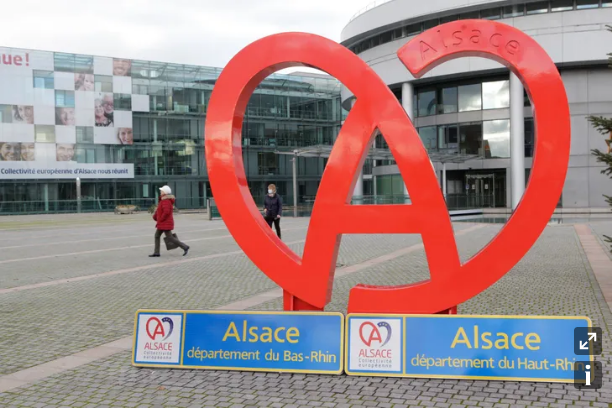France/L'Alsace becomes a local authority again
The new European Community of Alsace was officially created on Friday 1 January 2021, marking the institutional return of Alsace. On Saturday 2 January, the first president of this Community was elected. He is LR Frédéric Bierry.

Alsace is back with the official creation of the European Community of Alsace on 1 January 2021. Five years earlier, on1 January 2016, the Alsace region had disappeared, along with Lorraine and Champagne-Ardenne, in favour of the Grand-Est region. On Saturday 2 January, the president of this community was elected. It was LR Frédéric Bierry, who was the only candidate.
The entity has a special status. On the one hand, it has fewer competences than a regional council and remains attached to the region of Ghent-East. On the other hand, it has more than the two departmental councils it merges, Bas-Rhin and Haut-Rhin.
A new status
These new competences relate to cross-border cooperation with Germany and Switzerland, German bilingualism, local cultures, dialects and heritage, tourism and attractiveness. (in particular the Alsace brand, the Alsace Development Agency and Alsace Destination Tourisme), transport and mobility through the transfer of the national road network, including the A35 and A36 motorways.
Vehicle number plates symbolise the unique nature of the European Community of Alsace since, like a region, it has its own territorial marker, above the number of departments. These disappear as communities but not as administrative districts of the State: in practical terms, this means that the two prefectures are maintained, those of Bas-Rhin (67) in Strasbourg and Haut-Rhin (68) in Colmar.
Towards more territorial differentiation
This specific status is part of the questioning of territorial uniformity, resulting in France from a centuries-old effort of centralization, from the absolute monarchy to the Jacobin Republic. Already in 1918, the Bas-Rhin, Haut-Rhin and Moselle had been able to retain a local law governing associations, worship, Sunday rest and public holidays and health insurance.
Without even mentioning the overseas territories, this questioning was imposed at the same time as the deepening of decentralisation, of the special status of Corsica, from 1982, to the creation of the Metropolis of Lyon, on 1st January 2015. The "Gironde pact" promised by Emmanuel Macron is part of this movement through the preparation of the bill "deconcentration, decentralisation, differentiation, de(known as 4D), with the "differentiation" section aimed at "ensuring that each territory has laws and regulations adapted to its specificities ".
However, it is only just beginning. The new European Community of Alsace will have to negotiate, on the one hand, with the executive of the Grand-Est region its margins of autonomy in terms of economic development and attractiveness. On the other hand, to ensure a balance between Haut-Rhin and Bas-Rhin, since the latter dominates demographically, economically and symbolically, due to the Eurometropolis of Strasbourg where the seat of the European Parliament is located. In 2013, a merger of the two departments had failed after local consultation: 68% "yes" in Bas-Rhin, but 56% "no" in Haut-Rhin.
For the first plenary session on Saturday 2 January 2021 in Colmar (Haut-Rhin), a political compromise should be confirmed: the presidency to Frédéric Bierry (LR), outgoing president of the departmental council of Bas-Rhin, and the first vice-presidency to his counterpart of Haut-Rhin, Rémy With (various right). Pending the renewal of the assembly at the departmental elections scheduled for June 2021.
Source: www.la-croix.com


